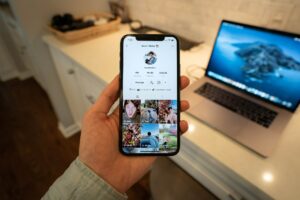Pinterest launched more than a decade ago in 2010, with interest in the site and app growing exponentially over time, solidifying Pinterest’s position as one of the most popular—and relevant— social destinations today. As of 2021, it ranks as the 14th largest social media platform in the world in terms of global active users, outranking other popular platforms including Twitter and Reddit.
The platform boasted more than 459 million active users at the end of 2020, a 37% YoY increase. Of those users, available platform data notes that 60% are women, with 30% of those women being between the ages of 25 and 34. But men are quickly catching up. According to reports, the number of men using Pinterest has increased by as much as 50% in recent months.
Image Source: https://business.pinterest.com/audience/
Pinterest is an established—and thriving—platform that offers incredible opportunities for brands, with many leveraging Pinterest ads to support their marketing programs. While it’s not a new social destination, and has been consistently popular among certain demographics for more than a decade, 2020 was an incredible year of growth. In fact, Pinterest noted a 6x increase in the number of businesses using the shopping ads format in Q4 of 2020. This ties in with a 300% increase in shopping conversions on the platform.
As is common for mature social media platforms, Pinterest uses algorithms to determine the content that users see. Unlike some other platforms, the inner workings of the Pinterest algorithm is more transparent by comparison. This gives brands a big advantage when it comes to getting eyes on content.
In this post, we share what we know about how the Pinterest algorithms work, and the history of the most impactful changes that have led to the Pinterest we know today.
Pinterest Search Algorithm
The 4 Primary Ranking Factors
The Pinterest search algorithm focuses on four main factors:
- Domain quality
- Pin quality
- Pinner quality
- Topic relevance
Domain Quality
Domain quality is how Pinterest perceives the quality of your website. Specifically, it wants to see how popular your website’s pins are. The more people interact with your pins, the higher your domain quality will be.
Pin Quality
Pin quality measures how many people interact with your Pin. The more people save, comment, click through, or “close up,” the higher the pin quality rating will be.
An important aspect of pin quality is how your followers first react to it; pins that prompt an enthusiastic reaction from your followers will then be shown to a larger number of people.
Pinner Quality
Pinner quality scores your effectiveness as a Pinterest content creator. It tracks how often you pin, how much interaction your pins receive, and how much you yourself interact with others.
Pinterest tracks the historical success of all of your pins, but also scores you based on what you re-pin. Re-pinning low-quality content can hurt your score, while re-Pinning high-quality content can boost it. What is unknown is how much weight this is given.
Pinterest’s most recent algorithm change prefers users share fewer, high-quality pins to flooding the site with a large number of low-quality pins. Pinterest partner Tailwind recommends that creators publish 15-25 pins a day for best results; that total includes new pins and re-pins.
Topic Relevance
Topic relevance is how Pinterest decides whether or not to show your content when a user conducts a search. This is primarily done through analyzing the keywords and hashtags on your Pin.
If all of this sounds similar to SEO, that’s because it is. Pinterest isn’t just a social media service; it’s also a search engine.
Controllable Distribution
In the mid-2020’s, Pinterest introduced an algorithm change called “controllable distribution.”
Typically, a user’s Pinterest smart feed would be based on things they had clicked, saved, or otherwise interacted with. But if a given user has never clicked on a video, does that mean that they will never want to see a video?
No, it doesn’t.
Controllable distribution is Pinterest’s way of diversifying the content in your stream. It sets a target number of impressions for different types of content based on what you’ve seen in the past.
Applying controllable distribution is a two-stage process. First, Pinterest creates your home feed based on the traditional ranking algorithm. Then, the controllable distribution algorithm reviews the variety of the content in this feed, and makes changes based on what you’ve searched for in the past.
For example, if 10% of your home feed has historically been composed of videos, then Pinterest’s algorithm will increase or decrease video content based on how close the initial home feed results are to your target content type preferences.
Pin Freshness
Pinterest’s most recent algorithm change stresses the importance of fresh pins over reused content.
A “fresh Pin” is a pin with a video or graphic that has never been used on Pinterest before. It can have the same title, description, or link as other pins; it’s the visual that’s important. And the visual has to be obviously different from the previous one in order to be considered fresh. Making small changes to your pin graphic isn’t going to trick Pinterest, and it’s not going to trick your audience.
If you’re publishing pins of a product, for example, it’s best to take photos from multiple angles so that you can use it for multiple pins instead of reusing the same images.
Re-Pinning
Re-pinning is when you add an existing pin to another board of your own. Re-pins are a good gauge of a pin’s popularity, and re-pinning helps your own pinner quality score. It’s best not to do it too much, however.
According to Pinterest’s latest algorithm change, re-pinning is best done in moderation. Tailwind recommends that you re-pin something to a maximum of 10 boards, also noting those boards have to closely match the pin’s topic.
Further, Tailwind recommends that you wait at least 2 days before pinning the same pin to a different board. Any more than this, and your re-Pins may be considered spammy, and your pinner quality score will suffer.
The Power of #Hashtags
A hashtag is a word or phrase that’s preceded by a hash (#) mark, such as #ballroom or #breakfast. It functions as a keyword that helps your pin gain more visibility. Ideally, the hashtag phrase would be closely related to the pin’s subject matter.
Hashtags are an effective means of widening your content’s reach. Now, whenever someone searches for a particular hashtag, all content that contains hashtags in the description (including yours) will be displayed in the results.
If you need ideas, Pinterest will suggest popular hashtags when you create new pins in the mobile app.
What is Pinterest Lens?
Pinterest Lens is a feature unique to the Pinterest platform. When a user takes a photo of virtually any object in real life, Pinterest Lens searches for and suggests pins with related themes or products. Users could photograph an avocado, for example, and get pins of recipe cards.
This changed Pinterest from being an image sharing and social media service to also being a powerful visual search tool.
Pinterest Lens was first launched in 2017 to lukewarm reception, but extensive updates to the AI and search algorithm were made during the beta period. Just 6 months later, the number of users doubled, and carried out over 600 million Lens searches a day—over 140% more than at launch.
But that’s not all that Pinterest did with Lens. In June 2020, Pinterest updated Lens and introduced a Shop tab right on the Lens results page so users could see a feed of shoppable pins that matched the image being queried. This worked hand in hand with the Shopify app, which made it easier for businesses to upload their catalogs to Pinterest.
Pinterest Algorithm Changes – A Timeline of Important Updates
July 2020 – Controllable Distribution
Pinterest’s goal with this algorithm update was to diversify content types on a user’s home feed. In an update on the official Pinterest Engineering Blog, they announced the Controllable Distribution process, covered in greater detail above.
June 2020 – Fresh Pins
Pinterest and Tailwind collaborated on a webinar that discussed the recent changes at the time. In the webinar, the Pinterest representative emphasized the importance of fresh pins and content with the new algorithm.
They also confirmed that repins are not going to get as much traction on the platform as before, and that fresh content is the best way to grow your Pinterest account.
February 2020 – Pinning Limitations
Pinterest’s authorized partner Tailwind shared information regarding pinning limitations that would help prevent pinners from being labelled as spam. Tailwind’s information boils down to the following guidelines:
- Do not save more than 50 pins a day
- Recommended pinning volume is 15 – 25 pins a day
- Repin to a maximum of 10 different boards
- Wait at least 2 days before repinning to a different board
“Brands should keep these limitations in mind as they curate their own organic content on Pinterest. You shouldn’t be contributing a large volume of Pins to your boards in a single day, but instead, planning to post throughout the week and repin relevant content on a regular basis.”
— Riley Spicer, Sr. Manager of Paid Social at Tinuiti
2018 – Algorithm Changes
In 2018, Pinterest reduced the distribution power of Group Boards due to the rise of gigantic boards with thousands of contributors. This led to large amounts of spam and loss of focus, along with genuine pinners receiving low engagement scores.
Pinterest representatives explained that group boards should be focused on one topic or keyword—the same as standard boards are—and shouldn’t have large numbers of contributors.
Pinterest also emphasized the value of fresh pins during this period, and recommended that creators should save new pins on a weekly basis, at the very least. Having multiple pins per page is acceptable in order to target different keywords and audiences.
It was also during this period that Pinterest stated that your new pins would be first shown to your follower base, and that early engagement determines whether or not it would be shown to a larger audience.







